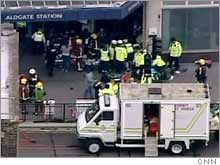 |
| London's Aldgate Station, near the site of the first of four explosions Thursday morning. |
|
|
|
|
|
|
|
|
|
|
|
NEW YORK (CNN/Money) -
The series of explosions that rocked London Thursday morning were a grim reminder of last year's train bombings in Madrid, the nightclub bombing in Bali in 2002 and the Sept. 11 attacks in New York and Washington, D.C. nearly four years ago.
They also left investors and policy-makers wondering what type of financial impact, if any, there might be around the world.
Stocks tumbled in Europe and posted more modest losses in the United States Thursday morning as investors initially bet the attacks might hurt the economies of many nations, especially those in Europe. But stocks quickly recovered.
Meanwhile, U.S. Treasury bonds rallied along with gold as investors sought safety. Oil prices swung wildly.
But some investment strategists and economists cautioned that it was too soon to gauge the possible short- and long-term effects of the attacks on economies in the United States, Britain and other countries in Europe.
Here's a look at what some said might happen to stocks, oil prices and the worldwide economy in the coming weeks and months.
Stocks: Don't panic
Even though U.S. stocks opened moderately lower Thursday, some strategists were quick to note that sell-offs related to terrorism tend to be short-lived. Along those lines, the Dow, S&P 500 and Nasdaq all bounced back from their morning lows and finished the day slightly higher.
"Markets tend to temporarily wobble, and then return to their prior behavior," wrote Barry Ritholtz, chief market strategist with Maxim Group, in a note to clients Thursday morning. "So don't panic or make any decisions based on your knee-jerk emotions."
In addition, while there hadn't been a major act of terrorism in more than a year, some investors may have already factored into stocks the fear of more attacks.
"There is some component of geopolitical-terrorist risks built into the markets already. That's one reason why we might not be suffering a much sharper decline," said Tobias Levkovich, chief U.S. equity strategist with Citigroup Smith Barney.
Levkovich added that the markets have typically bounced back quickly after terrorist attacks, especially if the attacks are outside the United States.
Investors, like many of the rest of us, may have become a bit desensitized to acts of violence, he noted, adding, "You can get a sense of near-term complacency."
Oil: Weak demand or supply disruption?
Oil prices went on a wild ride Thursday morning. U.S. crude sank as low as $57.20 a barrel in overnight electronic trading before recovering and moving back above $60, down about $1 on the day but near its all-time highs.
But where oil goes from here is a tough question to answer.
"You have two conflicting forces," said Dan Pickering, an analyst with Pickering Energy Partners, an independent research firm based in Houston. "People might be concerned about what the attacks will do to Europe's economies and if that will mean lower demand."
That explains why prices would fall.
"But this could make the supply side more vulnerable because it raises fears of a terrorist attack on energy infrastructure," added Pickering. And that could cause a spike in prices due to worries about supply disruptions.
Ultimately though, Pickering said, concerns about lower demand are probably more valid since many European economies were already growing slowly before Thursday's events. So a further slowdown could further depress oil prices.
The U.S. economy: Keep spending?
What happens to oil obviously could have an impact on the U.S. economy. But so far, the economy has shown a remarkable resiliency despite soaring oil prices.
Still, it's fair to worry about whether the London attacks could cause the U.S. economy to slow down.
"Businesses may react. We saw after 9/11 that there was some caution on the part of businesses regarding capital spending," said Ray Stone, economist with Stone & McCarthy Research Associates, an economic and fixed-income research firm based in Princeton, N.J.
But Stone thinks consumers are unlikely to pull back their spending too much, and as long as that's true he thinks the overall economic outlook for the U.S. remains much as it did before Thursday morning.
In other words, the London attacks are unlikely to alter the mind set of the Federal Reserve, which has been raising interest rates for the past year.
"Consumers might be more vulnerable to economic disruptions and less inclined to spend but it's a matter of degree," Stone said. "So I think the Fed will simply watch what people do in the weeks ahead and my best guess is that it stays on a measured pace path of rate hikes."
For more markets news, click here.
For a look at how bonds are reacting to terror fears, click here.

|